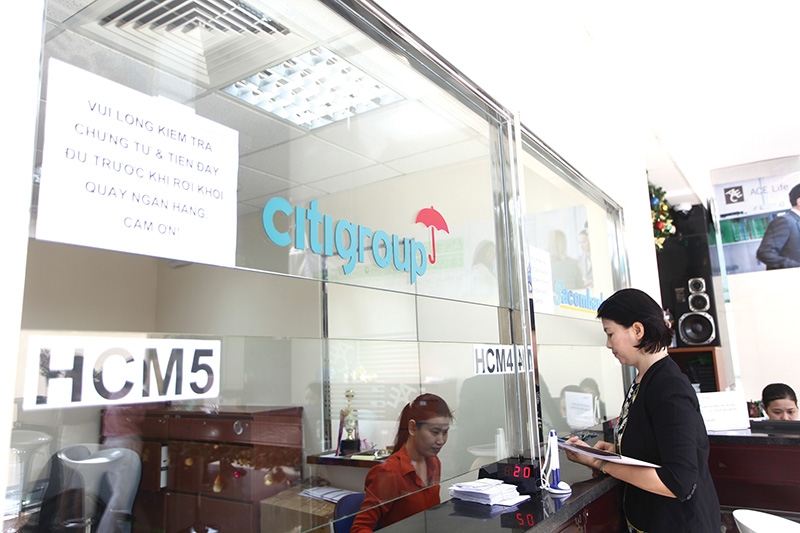Citigroup in retreat from retail banking
 |
| Citigroup first established its consumer bank in this country in 2009. Photo: Le Toan |
As part of the global financial services behemoth Citigroup, Citibank has exploited the substantial growth opportunities in Asia and built greater connectivity with its focused market strategy for decades.
However, Citibank earlier this month confirmed retreat from Asia’s retail banking landscape in 13 markets. Citigroup established the consumer bank in Vietnam in 2009 and has been developing its momentum with a growing market share in key businesses of credit cards, personal loans, cash advance, and insurance.
The withdrawal comes on the heels of Citigroup reporting record quarterly profits, boosted by a flurry of blank-check companies that it helped to become public during the period, according to Bloomberg.
Citigroup said it had released $3.9 billion in loan-loss reserves in the quarter, which resulted in a $2.06 billion gain after $1.75 billion in credit losses in the period. Analysts had expected a $393.4 million provision in the quarter. Citigroup would close retail banking operations in Asia and parts of Europe, including India, China, Australia, Bahrain, Indonesia, South Korea, Poland, Russia, Taiwan, Thailand, Vietnam, and more.
“As a result of the ongoing refresh of our strategy, we have decided that we are going to double down on wealth,” said the newly-minted CEO Jane Fraser. “While these 13 markets have excellent businesses, we don’t have the scale we need to compete. We believe our capital and other resources are better deployed against higher returning opportunities in wealth management and our institutional businesses in Asia.”
In Vietnam, Citigroup states that Citibank “remains at the top position as the first choice of many institutional investors and issuers in Vietnam, [and is] the market leader in introducing new and innovative products and solutions, and the pioneer in driving market developments.” However, at this moment, it could be too early to tell whether Citigroup would sell its retail unit to another lender.
Lai Minh Thuy, interim country officer at Citibank Vietnam said, “Citigroup has been operating in Vietnam for decades and its recent move in the retail banking sector will not affect our long-term commitments to Vietnam or Asia-Pacific.” Thuy also said that there will not be any immediate changes in its retail operations domestically as the exit process could take months or even years. “We will continue to serve our retail customers throughout this transition. There will not be any changes to Citi’s products or services,” she added.
According to Malaysian newswire The Star, costs were increasing 3-5 per cent yearly on a general basis while product and servicing charges remained flat or even declined. With the onslaught of fintech startups and new digital banks, big existing lenders need to consider restructuring their operations as the consumer business will come under severe margin pressures in the coming years.
The case of Citibank seems to be cut from the same cloth as ANZ’s strategy in 2017, when the Australian bank exited its retail banking in Vietnam and other Asian nations to concentrate on institutional business. ANZ said its retail business served 125,000 customers in Vietnam and included $240 million in lending assets and A$800 million (nearly $619 million) in deposits, but did not disclose the terms of the deal, stating that “premium to book value for the sale of the retail business in Vietnam is not material to the ANZ Group.”
ANZ then transferred all eight branches, including its retail staff from Hanoi and Ho Chi Minh City, to Shinhan Bank Vietnam under Seoul-based Shinhan Financial Group. ANZ said at the time that the sale of the retail business was in line with its strategy to simplify the bank and improve capital efficiencies.
Besides Citibank and ANZ, there are several cases that could epitomise the fierce competition in the industry, as some foreign banks are offload their stakes in locally-invested lenders. A few years ago, BNP Paribas SA sold its 18.68 per cent stake in Vietnam-based OCB for an undisclosed sum. Commonwealth Bank from Australia also sold its Ho Chi Minh City Branch to VIB. Likewise, HSBC and Standard Chartered Bank have also reduced their ownership in Techcombank and ACB in recent times.
What the stars mean:
★ Poor ★ ★ Promising ★★★ Good ★★★★ Very good ★★★★★ Exceptional
Related Contents
Latest News
More News
- Private capital funds as cornerstone of IFC plans (February 20, 2026 | 14:38)
- Priorities for building credibility and momentum within Vietnamese IFCs (February 20, 2026 | 14:29)
- How Hong Kong can bridge critical financial centre gaps (February 20, 2026 | 14:22)
- All global experiences useful for Vietnam’s international financial hub (February 20, 2026 | 14:16)
- Raised ties reaffirm strategic trust (February 20, 2026 | 14:06)
- Sustained growth can translate into income gains (February 19, 2026 | 18:55)
- The vision to maintain a stable monetary policy (February 19, 2026 | 08:50)
- Banking sector faces data governance hurdles in AI transition (February 19, 2026 | 08:00)
- AI leading to shift in banking roles (February 18, 2026 | 19:54)
- Digital banking enters season of transformation (February 16, 2026 | 09:00)

 Tag:
Tag:



















 Mobile Version
Mobile Version